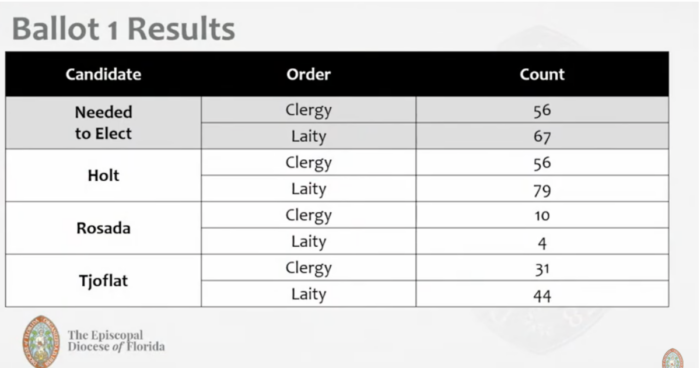Charlie Holt elected bishop coadjutor again in Diocese of Florida’s election redoPosted Nov 21, 2022 |
|
[Episcopal News Service] The Rev. Charlie Holt was elected bishop coadjutor of the Diocese of Florida at a special electing convention on Nov. 19, the second election held by the diocese this year, after a May election that Holt won was later nullified because of procedural objections. The contentious electing convention, which included objections from the floor by clergy and lay delegates, was the culmination of a process riddled with controversy over disputed election procedures, as well as Holt’s stance on same-sex marriage.
For the election to be complete, a majority of diocesan standing committees and bishops with jurisdiction must consent to the election within 120 days after being notified. If they do, Holt will be ordained and consecrated bishop coadjutor and will succeed Bishop John Howard as diocesan bishop upon the latter’s planned retirement in late 2023.
Holt, now serving on the diocesan staff, faced two other candidates, both of whom ran in the original May election: the Rev. Miguel Rosada of St. Luke’s/San Lucas Episcopal Church in Jacksonville and the Rev. Beth Tjoflat of St. Mary’s Episcopal Church in Jacksonville.
An independent auditor and Howard announced the results at the conclusion of the convention, held at Camp Weed in Live Oak. Holt was elected on the first ballot.
Nineteen votes were disqualified as “illegal.” Those, as auditors and Howard explained, were cast by delegates who had the right to vote but who selected all three candidates instead of one, apparently in protest. Two delegates abstained from voting.
“I’m very grateful for your support and for the opportunity to be in this role of bishop coadjutor-elect again,” Holt told the convention by phone after being notified of his election. “My prayer for us as we move forward into these next weeks and months – and I know we have some more hard work to do – is that we can … reach out our hands of love towards one another, and seek to bring not only those who don’t know the love of Jesus, but especially those of us who do.”
On Nov. 21, the diocese shared a letter from Holt in its announcement of the election, in which he wrote that “nothing has been easy about this bishop election process. At times it has been really hard.”[perfectpullquote align=”right” bordertop=”false” cite=”” link=”” color=”” class=”” size=””]Read full ENS coverage of the Diocese of Florida’s elections here[/perfectpullquote]
“Any election, by its very nature, is a contest that unavoidably divides us into different groups with majorities and minorities as we support our desired candidate and our desired outcome,” Holt wrote. “Our most recent election had particular tension. One person reflected to me that “watching the election online was like watching my parents fight.
“I am looking forward to serving you, praying with and for you, learning with you how we can be the hands of love in our communities,” Holt concluded. “Let us begin with love of one another.”
First election: Confusion, disputes and objections
In the May election, Holt was elected on the third ballot with 64 clergy and 80 lay votes. Tjoflat, the runner-up, received 52 clergy and 42 lay votes.
The election first came under fire from some Episcopalians inside and outside who criticized Holt’s statements on race and sexuality, saying they were insulting to LGBTQ+ and Black people, and his personal objection to same-sex marriage. Some wrote to their bishops and standing committees to encourage them not to consent to the election result.
In interviews and Q&A sessions with bishop candidates before the original election, Holt said he holds the view of marriage expressed in the 1979 Book of Common Prayer – that marriage is between a man and a woman. Since 2018, as a result of General Convention Resolution B012, same-sex marriage liturgies must be made available to all Episcopalians in countries where same-sex marriage is legal. The compromise resolution also allows bishops who disagree with same-sex marriage to delegate any required oversight of such marriages to another bishop. In a letter to the diocese after the election, Holt said B012 “will be followed and upheld to pastorally support both our progressive and conservative parishes.”
Holt also responded to the concerns in a June video message to members of the diocese and The Episcopal Church in which he apologized for what he described as poor word choices and defended his record on engaging across cultures as a priest.
The election also faced a formal objection from some delegates who alleged that the diocese had not reached the required quorum of clergy necessary to hold the election. The rules were changed two days before the election to allow clergy to participate remotely but not lay delegates, and the objectors alleged that those who voted remotely did not count toward a quorum. The diocese maintained it was the only safe and reasonable way to reach a quorum, given the large number of retired elderly clergy who could not be present at the election in Jacksonville.
The formal objection triggered an investigation by the churchwide Court of Review. The court’s report, released in August, said the election was “procedurally and canonically problematic“ and that “irregularities create seeds of uncertainty that call into question the integrity of the process,” though it added that diocesan leaders were “devoted and faithful in their attempt to ensure a fair election” despite being “faced with an extremely unfortunate circumstance.”
On Aug. 19, the diocese announced that Holt had withdrawn his acceptance of the election, prompting the second election.
– Egan Millard is an assistant editor and reporter for Episcopal News Service. He can be reached at emillard@episcopalchurch.org.



Social Menu